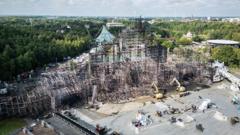The ongoing military engagement between Israel and Iran has intensified dramatically, with both nations conducting relentless air and missile strikes that have resulted in significant civilian casualties and damage to critical infrastructure, igniting serious concerns over a potential escalation into a wider regional war.
Escalating Tensions: Israel and Iran Engage in An Intense Military Conflict

Escalating Tensions: Israel and Iran Engage in An Intense Military Conflict
A new wave of deadly military confrontations between Israel and Iran raises fears of a broader conflict, as both countries launch heavy assaults.
Israeli fighter jets unleashed a barrage of attacks on Tehran, targeting strategic sites including the capital's primary gas depot, while Iran retaliated with a heavy missile offensive aimed at Israeli territories. This recent escalation marks one of the most severe phases of military conflict between the two nations in their enduring rivalry.
The Iranian capital saw plumes of smoke and flames soar into the sky following Israeli airstrikes on Saturday, significantly damaging the Shahran fuel depot, a vital facility for Iran's energy sector. Witnesses reported the explosions were so powerful that they felt akin to seismic tremors. As a result of the strikes in Iran, the death toll climbed to over 70, including several prominent military leaders. On the Israeli side, at least 11 civilians have been reported killed, with a growing number of injuries as missiles rained down on residential areas, including Tel Aviv and Bat Yam.
The escalatory dynamic ignited following an initial Israeli onslaught targeting Iran's nuclear infrastructure, which includes its primary facility at Natanz, claiming the lives of top security officials. Israeli operations, bordering on 150 airstrikes across two days, have prompted Iran to execute over 200 missile strikes in retaliation, underscoring the dangerous scale of this exchange.
In the wake of the conflicts, urgent calls for de-escalation from international observers appear to have been ignored by both countries, with military actions intensifying instead. Israeli military spokesperson Brig. Gen. Effie Defrin emphasized the achievement of "freedom of action" in the skies over Tehran, showcasing Israel's readiness for further strikes.
The situation escalated dramatically as the U.S. response remains vigilant but unclear, with President Trump pledging overwhelming force against any Iranian response that targets American forces. As civilian populations endure the brunt of the conflict, the potential for wider regional instability looms, with both nations bracing for further retaliation amidst ongoing air and missile offensives.
As this conflict unfolds, the humanitarian costs continue to grow, raising urgent questions about the escalation’s potential to draw in international intervention and affect the stability of the Middle East.




















